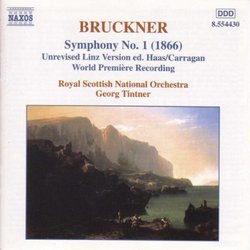| All Artists: Anton Bruckner, Georg Tintner, Royal Scottish National Orchestra Title: Bruckner: Symphony No. 1 (1866 Linz Version, ed. Haas/Carragan) / Adagio (1876) to Symphony No. 3 Members Wishing: 0 Total Copies: 0 Label: Naxos Release Date: 5/16/2000 Genre: Classical Style: Symphonies Number of Discs: 1 SwapaCD Credits: 1 UPC: 636943443026 |
Search - Anton Bruckner, Georg Tintner, Royal Scottish National Orchestra :: Bruckner: Symphony No. 1 (1866 Linz Version, ed. Haas/Carragan) / Adagio (1876) to Symphony No. 3
CD Details |
CD ReviewsA visionary conductor reconsiders Bruckner Bruce Hodges | New York, NY | 06/28/2002 (5 out of 5 stars) "Although the First is not the most popular of Bruckner's symphonies, it is nevertheless absorbing, not to mention tantalizing in its premonitions of the symphonies which would come later. The beginning of a new symphonic cycle can be an exciting event, and Bruckner's First, begun so late in the composer's life, is quite sophisticated - at least, in this highly evocative version by Georg Tintner and the excellent Royal Scottish National Orchestra. This recording, the first of the original version from 1866, is very special, and Tintner's illumination will be startling for those who know the symphony. Some of the harmonic changes are almost radical, given the time period. The last movement is strange enough that it will have you rethinking the composer's work completely - no small feat. There were moments when I almost felt as if I were listening to early Schoenberg. But small differences in the language are evident in the three prior movements as well. Without going into exhaustive harmonic detail, listening to this recording caused me to muse on how Bruckner's path might have changed, and music history altered, if this "first draft" had received overwhelming acclaim. It might have led to even more original thoughts in the subsequent symphonies. After hearing this recording, the revised versions seem, well, more conservative. The Royal Scottish National Orchestra sounds magnificent, and I'm not even going to qualify that comment, as some have, by comparing them with other "more Brucknerian" orchestras. What has been accomplished here is huge, and the RSNO's beautiful, heartfelt playing must be considered in any assessment of success. They get the job done, and more so. The Naxos recording is gorgeous - one of their best - with glowing, realistic sound and the huge climaxes making a great impact. But it is Tintner, who sadly died just as his Bruckner cycle was complete, who will be really missed. It is intriguing to imagine the heights he might have reached, had he lived to explore (and record) the symphonies further. And his liner notes - scholarly and persuasive - show us that he was a fine writer as well. So I cannot recommend this disc highly enough, particularly for Bruckner fans - but anyone new to the composer will find it just as satisfying. All the Brucknerian hallmarks are here: the long phrases rising to ecstatic climaxes, the subtle chord progressions embarking on journeys to other keys, the glorious writing for massed choirs of instruments, especially the brass section. I only wish Georg Tintner were still alive so I could congratulate him on what he accomplished: a major addition to our understanding of this composer." Tintner Does It Again davidsbundler | Belleville, Ontario, Canada | 06/19/2000 (5 out of 5 stars) "Before his recent death, Georg Tintner bequeathed to the world the premiere recording of the original version of Bruckner's 1st Symphony. I would rate the performance as being 9 out of 10. The recording rates a 9 out of 10 as well. As for the version, anyone familiar with the usual "Linz Version" will not find many things very different. There are three passages in the finale that are somewhat different. Perhaps, a bar here or there in the other three movements as well. Nevertheless, I believe that this version has value since it gives us Bruckner's first thoughts. This CD lives up to the high standards that Dr. Tintner and Naxos have set. I heartily recommend the entire series to all those who are unfamiliar with the composer and to comparative Brucknerheads." Very Very Good Bruckner 1 David Rothstein | Shaarei-Tikva Israel | 11/19/2000 (5 out of 5 stars) "This is the 2nd CD of Tintner's Bruckner I have bought and I heartily recommend both of them (also the 9th).One feels the presence of a master Brucknerian sharing his love of the music with the orchestra and with us. The notes enclosed were prepared by Tintner himself thus endowing the performance with an even more personal touch of the conductor.Tintner presents in this rendering (of the original version) an expansive performance (opposite of Jochum) but just right, stressing the more heroic nature of the work. I particularly liked the 1st movement. I felt a bit disappointed with the 4th movement especially the climax after the 2nd (lyrical) theme. Maybe this is true to the original version but the almost total absence of the strings in this climax is disappointing.The recording is excellent and the performance is very good. If I'm not mistaken the 2nd violins are positioned on the right (European style) and this is very enjoyable.At the very budgeted price- a must."
|


 Track Listings (5) - Disc #1
Track Listings (5) - Disc #1